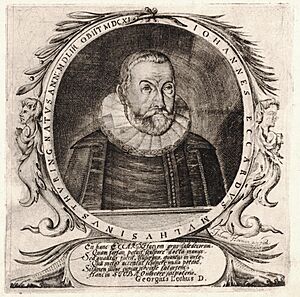Johannes Eccard facts for kids
Johannes Eccard (born in 1553, died in 1611) was a German composer and a kapellmeister. A kapellmeister was like a main music director or conductor for a court or church. Eccard was one of the first important conductors at the royal chapel in Berlin.
Contents
Life Story
Johannes Eccard was born in a town called Mühlhausen in what is now Germany. When he was 18, he moved to Munich. There, he became a student of a very famous composer named Orlando Lasso. Eccard might have traveled to Paris with Lasso.
By 1574, Eccard was back in Mühlhausen. He stayed there for four years. During this time, he worked with Joachim a Burck. They helped put together a collection of sacred songs. Soon after, Eccard got a job as a musician for Jacob Fugger, a wealthy banker in Augsburg.
In 1583, he became an assistant conductor. By 1599, he was the main conductor in Königsberg. He worked for Georg Friedrich, who was a ruler in the Duchy of Prussia. In 1608, Eccard was asked to be the main conductor in Berlin. But he only held this important job for three years. He passed away in Königsberg in 1611.
His Music
Eccard wrote only vocal music. This means his music was made for singers. He composed songs, sacred cantatas (pieces for singers and instruments), and chorales (hymns). His music often had four, five, or even up to nine different singing parts.
His music was very complex and beautiful. It showed amazing skill in how different voices worked together. At the same time, his songs were full of deep religious feeling. Before the First World War, his version of Martin Luther's famous hymn, "Ein feste Burg ist unser Gott" ("A Mighty Fortress Is Our God"), was seen as a very important national song in Germany.
Eccard and his style of music are closely linked to the history of the Protestant Reformation. Many collections of his songs still exist today. One important collection was published in 1843 by Baron Karl Georg August Vivigens von Winterfeld.
Well-Known Works
Here are some of the musical pieces Johannes Eccard composed:
- Motet on "Nun liebe Seel, nun ist es Zeit"
- Nun schürz dich, Gretlein, schürz dich
- Übers Gebirg Maria geht, a five-part motet
- Christ ist erstanden
- Es rühmt die Heilige Schrift (from 1591)
- Nachdem die Sonn beschlossen (from 1600)
- Wir glauben all an einen Gott
- Maria wallt zum Heiligtum (also known in English as "When to the temple Mary went")
See also
 In Spanish: Johannes Eccard para niños
In Spanish: Johannes Eccard para niños
 | Kyle Baker |
 | Joseph Yoakum |
 | Laura Wheeler Waring |
 | Henry Ossawa Tanner |


